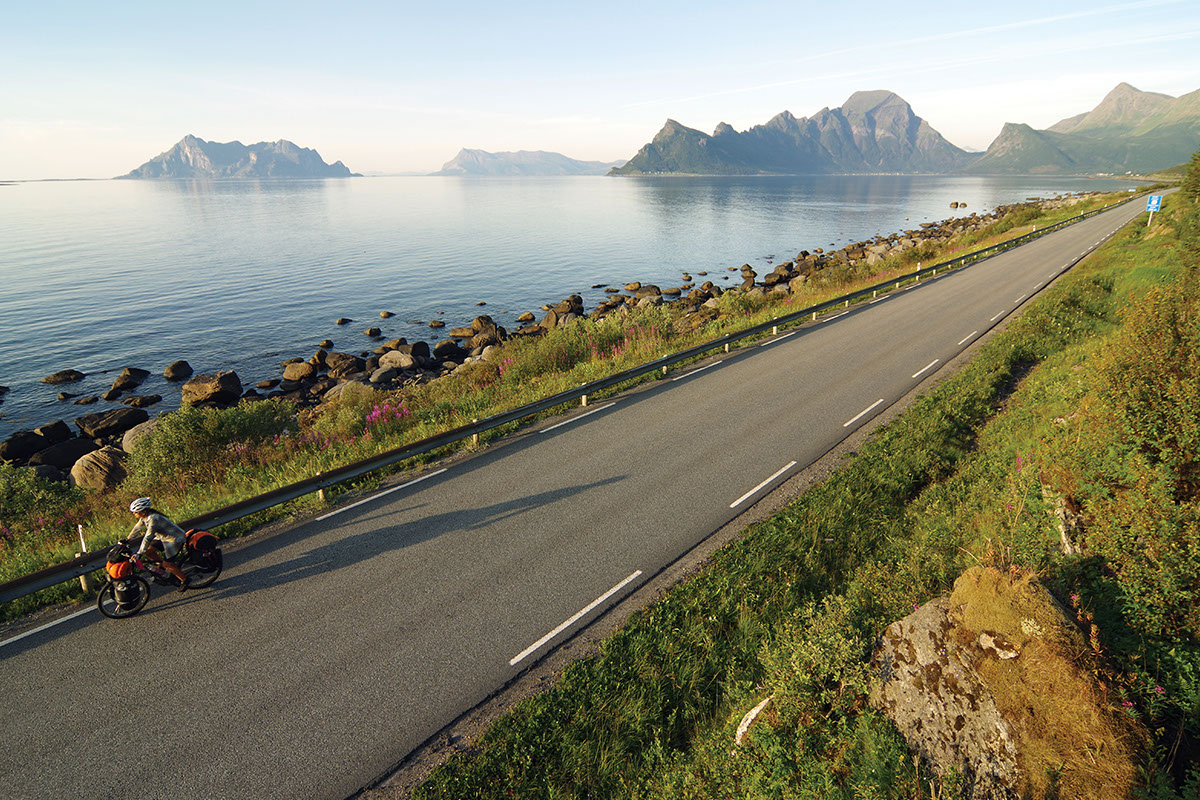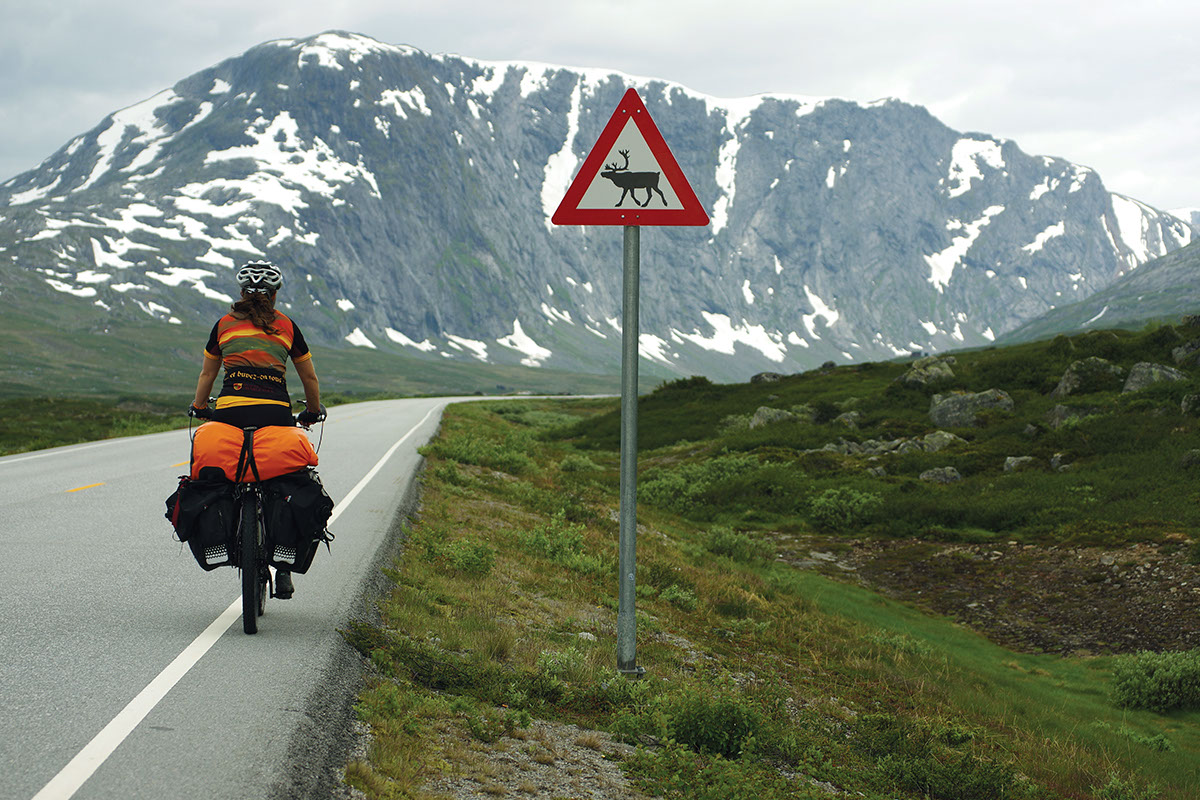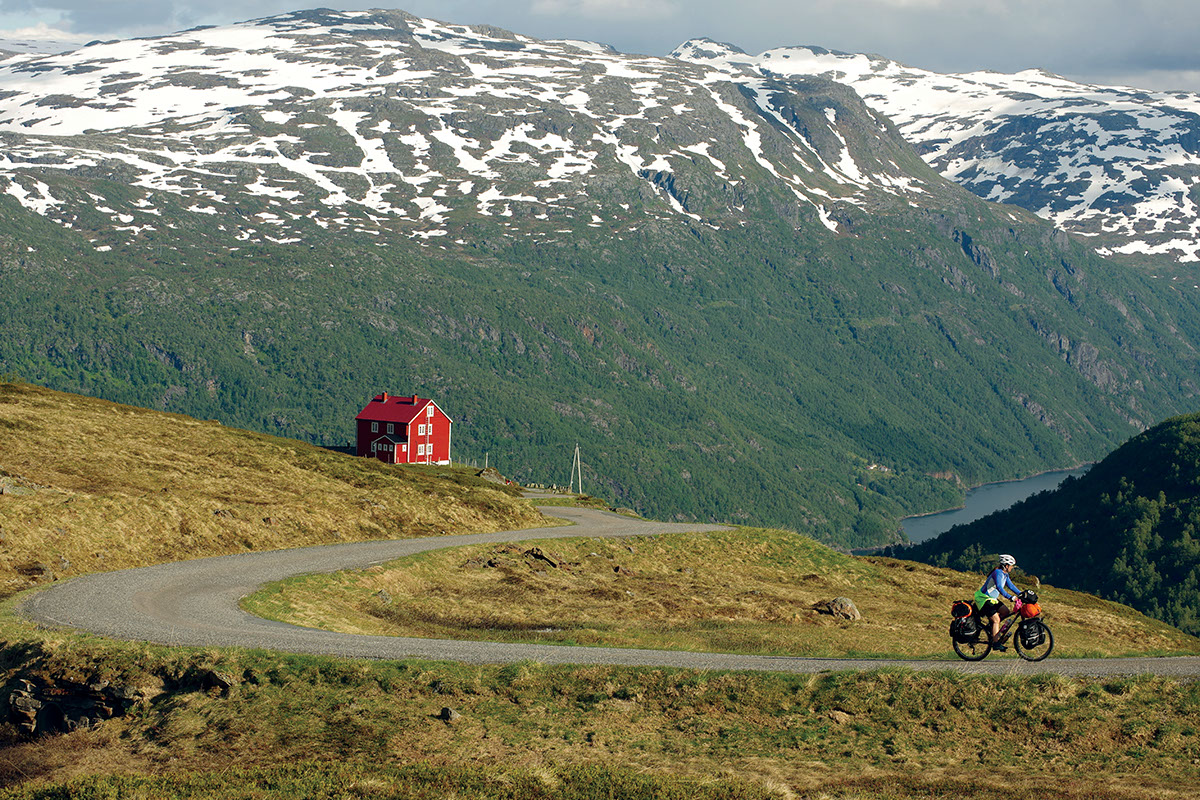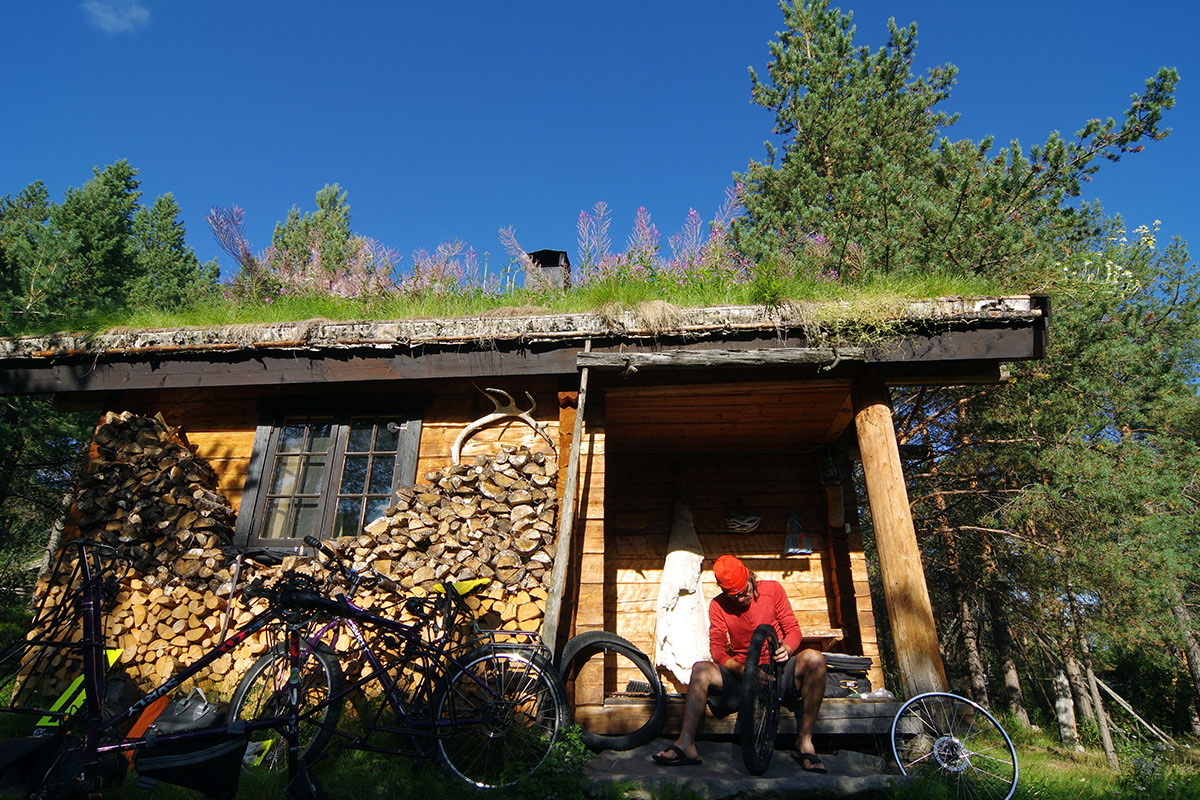A Perfect Summer’s Ride in Norway
This article first appeared in the May 2016 issue of Adventure Cyclist magazine.
“Kautokeino? Nei! Nei!” shouted the blue and red gákti-clad Sámi woman as we pointed to the head of Ofot fjord and the road leading to the port of Narvik. We had managed clumsily to gesture that we were riding up into Sweden’s Lapland and onward back into Norway to the Sámi reindeer herder’s town of Kautokeino, which coincidentally was the hometown of the lady standing in front us. Then, in a rather straightforward roadside theatrical act, the traveling souvenir saleswoman put us back on track to the turnoff we had missed. After exchanging a few road courtesies, the lovable nomad in pink Crocs hugged us and urged us to put on our rain gear, gazing at the leaden sky looming over the fjord’s snowy peaks. We executed each of her orders as she retired to the reindeer-skin and antler-filled lavvu (Sámi tent) reigning over the vacant lot by the sea. Excited by this first encounter with a nomad, inaugurating our new pedal-powered investigation, we headed into the storm.
The fantasy of cycling up and down the coast of Norway had been haunting us for years. Including the perimeter of Svalbard and Jan Mayen up in the Arctic, Norway’s rugged shoreline is estimated to stretch for about 80,000 kilometers, including thousands of islands and a myriad of inlets lined by vertical cliffs. The roads that hug this tormented topography, where the Scandinavian Alps meet the ocean, are neither straight nor flat. Sinuous curves, steep grades, and countless switchbacks are trademarks. Cycling in Norway along the coasts of the North, Norwegian, and Barents Seas is stimulating and invigorating. Saline spindrifts emanate from the sea as riders summit mountain passes that link fjords and ranges. It’s as if coastal Norway was made for epic bicycle touring.

The first 250 kilometers out of Stavanger saw us hauling our loaded, 50-kilogram Surly Trolls over 4,300 meters of steep inclines, which was a very efficient, if Spartan, training camp. With the sufferings of acclimatization gone in record time, the magic of this amazing land swept us like a tailwind through some of our planet’s most spectacular scenery and roads (see Norway’s National Tourist Routes, in the Nuts & Bolts). Under the midnight sun, we snaked our way up, down, and around the coast’s jaw-dropping fjords and celestial plateaus jutted with glaciated summits all the way to the Lofoten islands, well above the Arctic Circle, and now to this vacant lot by the sea, the gateway to Lapland.

We owe to the Sámi, the indigenous people of Lapland, the pretext for exploring the coast of Norway and parts of their traditional homeland, which extends into northern Sweden, Finland, and Russia’s Kola Peninsula. Having discovered during our last expedition — a six-year, 60,000-kilometer quest to circumnavigate the Pacific Ring of Fire — that exploiting a theme enriches the journey with added layers of meaning, we vowed to never undertake a trip without first choosing a theme. In June 2014, we left our Charlevoix, Québec, basecamp, where we had enjoyed a lengthy break from the road in what we called a temporary “de-nomadization” session, and flew to Stavanger, Norway, intending to meet with nomadic peoples from Europe’s Nordkapp to Africa’s Cape Agulhas. When we launched our new project, called NOMADS2, we knew we were embarking on an epic ride, a true voyage of exploration, and inevitably an introspective journey during which we would collect stories and pictures from our saddles. Indeed, this three-year, 35,000-kilometer cycling odyssey in the company of herders, hunter–gatherers, and indomitable travelers would provide plenty of opportunities to reflect on our own nomadism.

In Kautokeino we learned after passing through many a deserted siida — a Sámi reindeer-herding community — that the herders and their animals had traveled north through vast expanses of undulating taiga to the coast, around Hammerfest, to escape the summer pests and mugginess. We left Kautokeino and rode across a plateau of arctic tundra to the little coastal city of Alta, sitting astride the 69th parallel. Beyond the city limits, hundreds of reindeer began to appear by the roadside. The Sámi we met talked about the eight seasons of their semi-nomadic lives, divided by tasks, seasonal movement of livestock, summer and winter camps, and the mating and calving of reindeer. GPS, ATVs, mobile phones, chain saws, and even motorboats and helicopters have replaced some of their traditional tools, but the lifestyle is still rigorous and requires hard work, impeccable skills, and respect for nature.

Dollops of golden yellow cloudberries on chocolate chip cookies powered our pedal strokes along Porsanger Fjord to the dreaded tunnel linking the mainland to Magerøya Island. The seven-kilometer–long underwater tunnel is a much-discussed topic among cyclists riding to Nordkapp, but we have no choice in the matter as it is the only way to the sought-after headland. An abrupt, bone-chilling plunge to 212 meters below sea level is followed by a steep, sweaty climb up the other side. Alive and grateful to be out of the dark corridor, we pushed harder on the pedals, fighting a jagged topography and muscular wind but sensing an urgency to reach this legendary destination. For centuries, explorers, adventurers, and kings have been drawn to this cliff at 71° 10’ 21” N — now there is a fence, a gate, and an entrance fee, which is waived for cyclists. Looking over the Barents Sea under an evening sun, we paused, turned around from the famous cul-de-sac, and started a new chapter: the southward journey to Cape Agulhas in South Africa and a rendezvous with many more nomads.
Nuts & Bolts
Expensive? Norway?
Norway can be very expensive — except for jars of jam and tuna cans. Fortunately, cycling and camping can offset your transportation and lodging costs, thanks to the Allemannsrett. In order to increase the mileage of our Norwegian crowns (NOK), we scanned supermarket shelves for discounted perishables like bread, pastries, dairy, fruits, and vegetables. We even created a beer and wine fund by collecting empties left on the side of the road (which were surprisingly abundant) to cash in on the generous deposits — 25¢ or 50¢ each. We estimated having earned the equivalent of more than $300 during that summer in Norway.
Allemannsrett, Norway’s Outdoor Recreation Act
“The purpose of this act is to protect the natural basis for outdoor recreation and to safeguard the public right of access to and passage through the countryside and the right to spend time there, etc., so that opportunities for outdoor recreation as a leisure activity that is healthy, environmentally sound, and give a sense of well-being are maintained and promoted.”
For bike travelers, the implications of this law, promulgated in 1957, are twofold: it gives you access to the land for the practice of recreation and allows you to camp free almost anywhere. The Allemannsrett also protects the right to collect wild berries, plants, and mushrooms. Besides respecting fenced private property and observing the leave-no-trace code of ethics, this law stipulates that campsites be on open, uncultivated land at least 150 meters from any inhabited building and allows for a maximum of two consecutive nights at any one campsite unless you’ve received permission from the landowner.
Norway’s National Tourist Routes
To enrich the visitor experience, Norway has selected 18 segments from its scenic road network to constitute the National Tourist Routes. Varying from 27 to 433 kilometers in length, the National Tourist Routes crisscross some of Norway’s most awe-inspiring panoramas. The roads feature futuristic rest areas, dizzying viewpoints, and monumental art installations that aim to create a greater comprehension of these mesmerizing Nordic landscapes. Renowned Norwegian and international artists were commissioned to showcase natural values as well as cultural and historical characteristics. Although some of these roads are quite busy during the high season, they simply can’t be overlooked.
For More Information
NSB (Norway national railway system)

